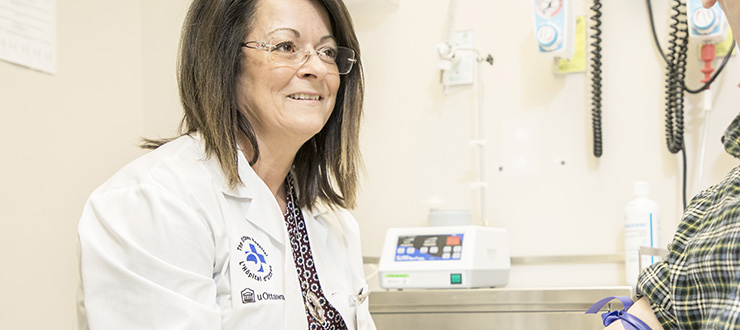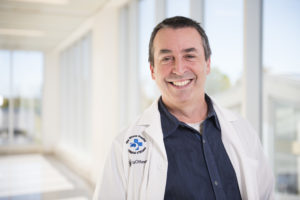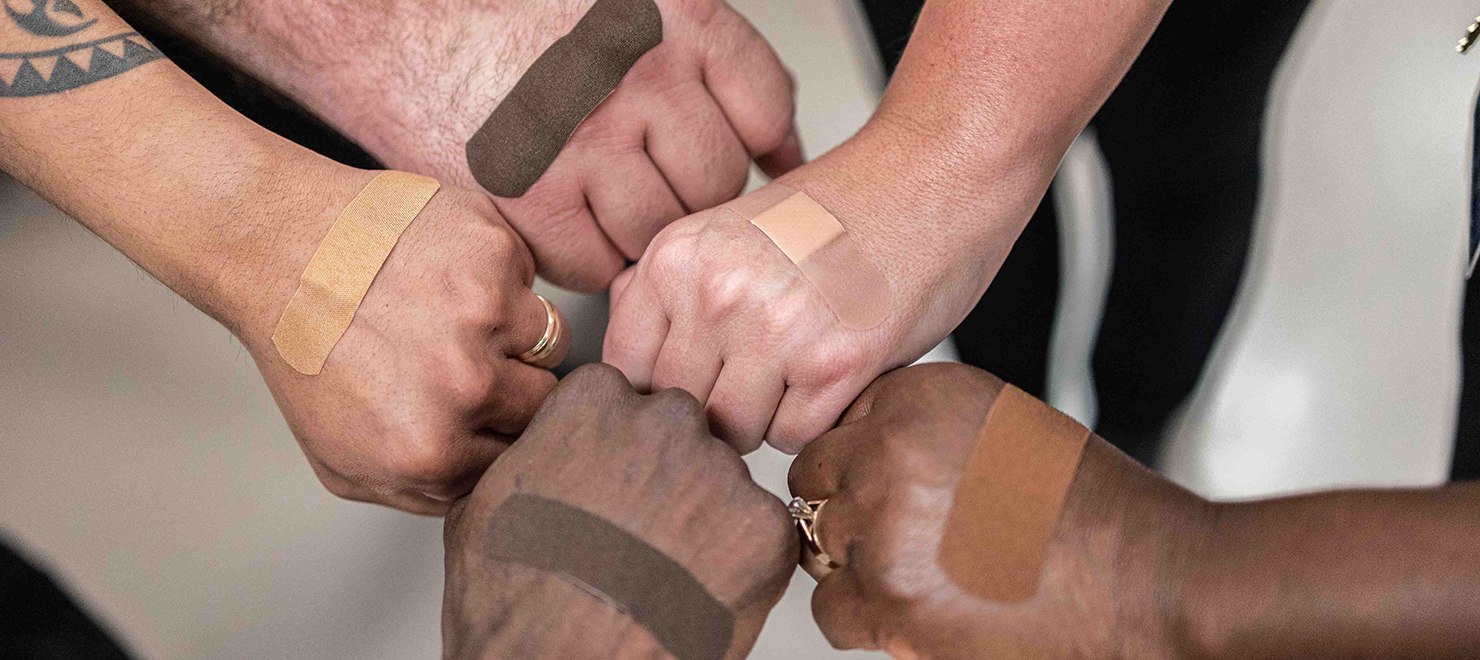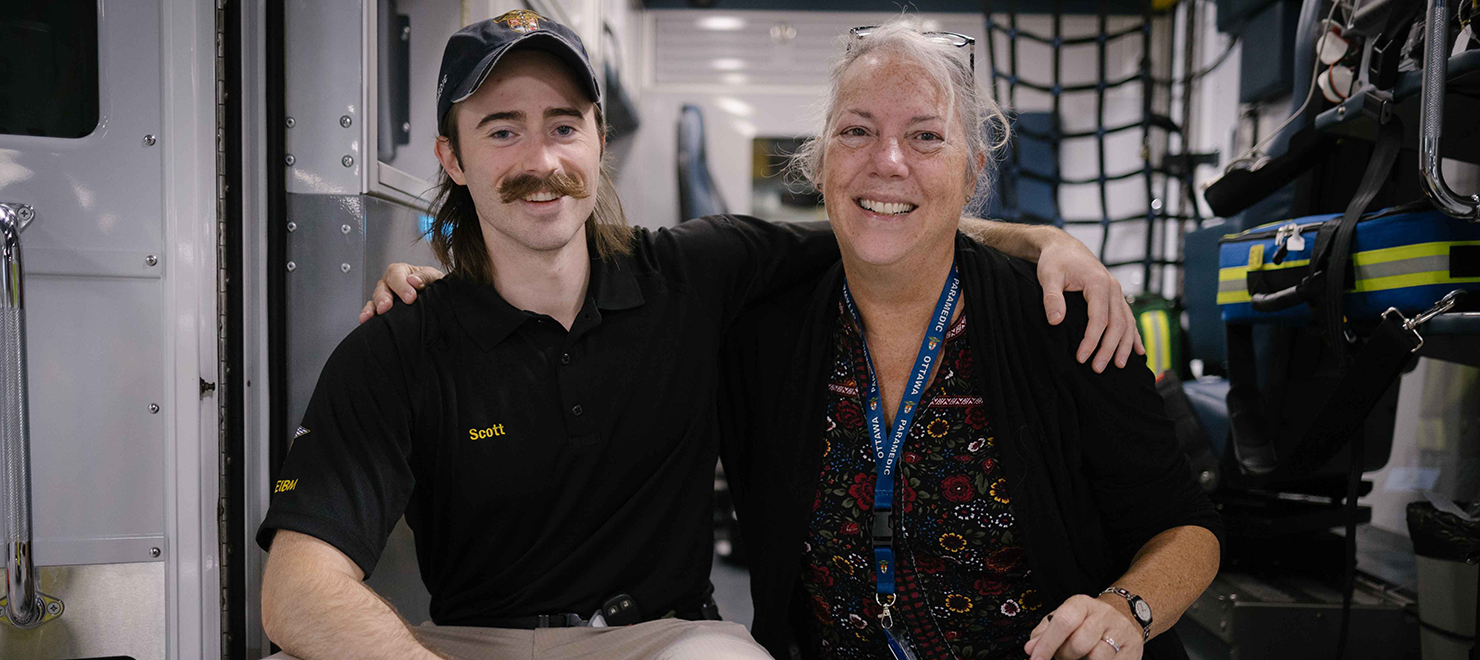
Clinical Research Coordinator Nancy Tremblay takes blood samples from a patient as part of the clinical trial.
When John Henry spent three weeks cycling across Great Britain last summer, he didn’t need to take along a three-week supply of antiretroviral pills for HIV. Instead, Henry receives an injection once every eight weeks.
“Replacing daily pills with something that is injected and slowly released into the body – it amazes me that it’s possible, but it works,” said Henry. “You’re free from pills, which is great if you go on vacation. And between the eight weeks, you actually forget that you have it.”

Dr. Jonathan Angel, Head of Infectious Diseases at The Ottawa Hospital and Associate Professor of Medicine at the University of Ottawa, led a study to find if an injection was as effective as a pill for controlling HIV.
For Henry, taking a pill is a daily reminder that he has the human immunodeficiency virus (HIV), which breaks down the immune system until the person can’t fight off infections or diseases. Two decades ago, a diagnosis of HIV was a death sentence. While there is still no cure, taking one pill a day can suppress the virus. If patients stop taking it, the virus can resurface in their body.
Henry is part of an international study, co-authored by Dr. Jonathan Angel, that showed how an injection of the long-lasting forms of antiretroviral drugs every four or eight weeks could suppress viral growth just as well as a daily pill. The trial involved nearly 300 patients across 50 sites in five countries. In Canada, only The Ottawa Hospital and one site in Montreal took part in the clinical trial. The trial targeted people who had not taken any antiretroviral medication. Henry fit this criteria, since he had been recently diagnosed when the trial opened in June 2014.
Henry was randomized to receive an injection of antiretroviral therapy every eight weeks. Chad Raymond was randomized to receive the treatment every four weeks.
“I got a firm diagnosis, two months before taking treatment,” said Raymond, who began taking part in the trial in October 2014. “The idea of doing injections appealed to me because of the infrequency of it. I was happy to get away from doing something on a daily basis, as I worried about missing a dose. So an injection once every month was more appealing.”
Treatment for HIV has improved greatly over the past couple of decades.
“Years ago, a person had to take a handful of pills two to three times a day, and there were lots of side effects,” said Nancy Tremblay, Clinical Research Coordinator for the trial. “That contributed to a lot of non-compliance, as some patients couldn’t tolerate the medication. So we’ve progressed from that to one pill, once a day. It’s very effective with very few side effects, if any. And now injectables offer another option.”
Patients receive two separate intramuscular injections of the antiretroviral drugs cabotegravir and rilpivirine in their buttocks. Tremblay explained that the drugs are released slowly into the patient’s system and last a full month or two months, depending on which schedule they are on.
“The delivery method is not for everybody,” said Dr. Angel, Head of Infectious Diseases at The Ottawa Hospital and Associate Professor of Medicine at the University of Ottawa. “The big thing is it provides another option for people who have a physical or psychological aversion to taking pills.”
People taking part in the study will still have access to the drug after the study is completed.
“This is a drug they have to take for the rest of their lives,” said Tremblay. “When there is a study, the pharmaceutical company has a responsibility to keep treating the patients, if the treatment is working.”
Dr. Angel said the challenge, once the injection form is approved by Health Canada, is who will administer the drug.
“Coming into a clinic to get your prescribed medication isn’t the answer,” he said. “It’s fine when it’s during the trial, but afterwards, it is still not clear who will be trained to give the injections and where will they be done: doctors in their offices, pharmacists, or nurses visiting patients in their homes. While it is still a year or two before approval and they are commercially available, there are unique issues that will need to be sorted out.”
Until then, patients at The Ottawa Hospital, like Henry and Raymond, are contributing to and benefiting from this research. Many more patients world-wide could benefit if the drug is approved.
The study was funded by ViiV Healthcare and Janssen R&D. Community support for The Ottawa Hospital is also crucial for all research studies, in particular research into HIV and gay men’s health.

Support patient care and research at
The Ottawa Hospital
You might also like…
A volunteer program that taps into the power of music
Studies have shown that music can benefit the body, mind, relationships and community. Musical Moments is a program where volunteers play live music to support positive outcomes for patients, visitors and staff.
We’ve got you covered: The Ottawa Hospital now offers bandages for a variety of skin tones
Whenever you’ve scraped your knee or had your blood drawn, odds are your bandage was the same colour every time. Peach has been the default hue for over a century — but no longer at The Ottawa Hospital.
New gender-affirming surgery clinic now accepting patients
The Ottawa Hospital’s new gender-affirming surgery clinic is truly one of a kind. Launched in September 2023, it’s the only clinic in Ontario to offer trans and non-binary patients facial, top and bottom procedures. Plastic Surgeon Dr. Nicholas Cormier and his team are happy to announce that they are now accepting patient referrals from physicians.
Patient gifts a piece of home to Indigenous Cancer Program
Inuit patients can now see and hold a piece of their traditional territory in the Windòcàge Room at the General Campus, thanks to an interactive gift donated to The Ottawa Hospital by a cancer patient.
Mental health professionals and paramedics team up to help people in crisis
Seven days a week, a mental health professional from The Ottawa Hospital hits the road with a paramedic from the Ottawa Paramedic Service. Together, they respond to 911 calls for mental health emergencies across the city. Social worker Cindy Gill and paramedic Scott Farrell share how the Mental Wellbeing Response Team provides quality care for patients out in the community.
Second Chance: Don’s song for the people who saved his life
Making music has always been a big part of Don’s life, so when the staff and doctors at The Ottawa Hospital saved him from the brink of death, he could think of no better way to thank them.


 To reset, hold the Ctrl key, then press 0.
To reset, hold the Ctrl key, then press 0.






Comment on this post